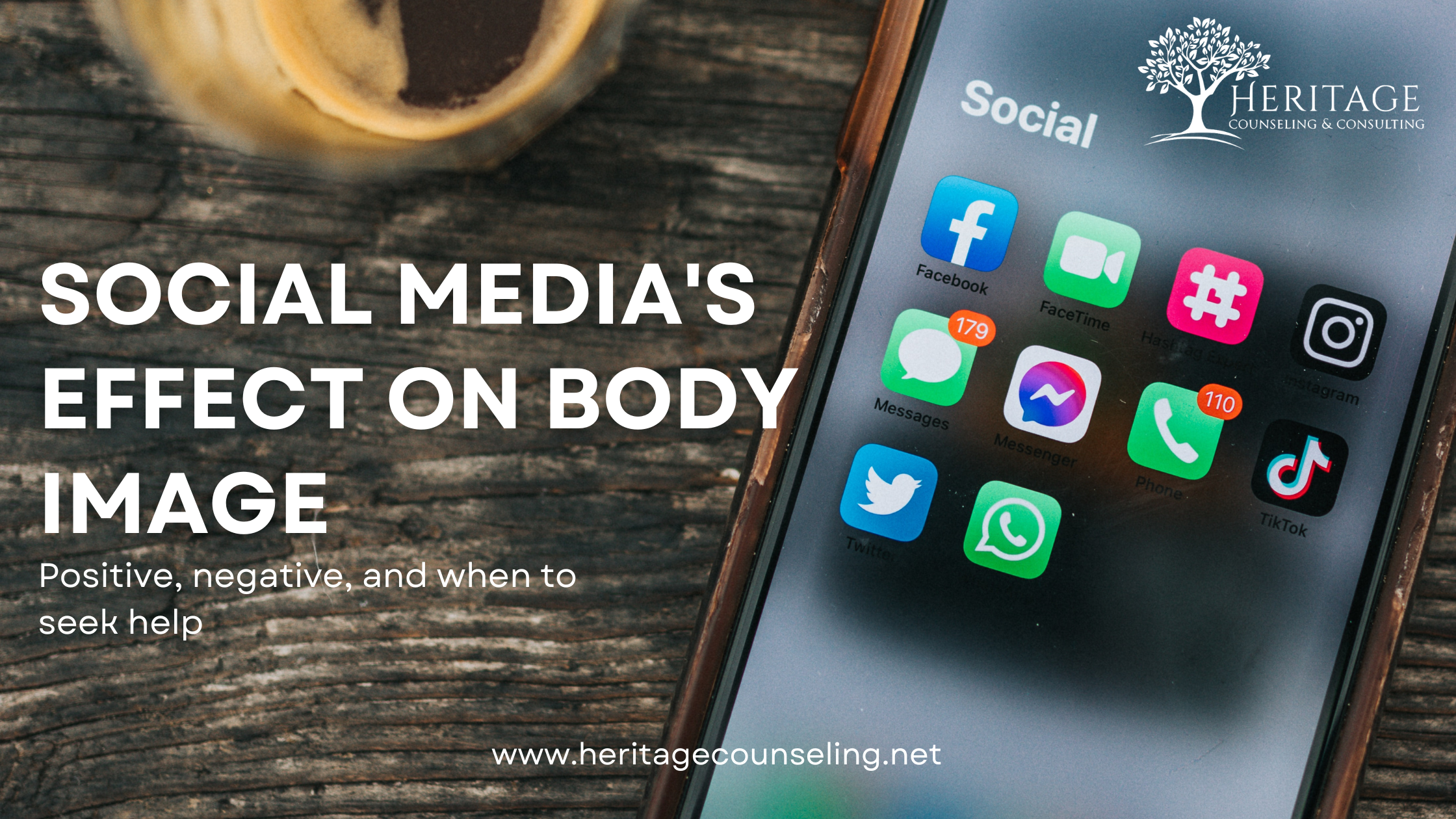Social Media was created as a platform for individuals to safely express themselves; however, as the years have gone on, the standards of social media have changed. Social media can be a powerful tool for creativity, yet it is seen that unrealistic and impossibly perfect images of beauty standards, body shapes, and lifestyles are being posted left and right. Social media presents perfect images of faces and bodies, filtered pictures, and constant editing in order to create a specific image. All of this can lead to a negative body image as one begins to compare themselves and struggle with their own body. Social media has a few negative effects on body image such as comparison, body image disorder, and obsessive exercise. Although social media can be negative, it has positive attributes as well; such as body positivity, support, and learning to build boundaries.*
How individuals view themselves and their body image is highly correlated with what they see around them, such as social media posts, magazine covers, movies, etc. Body image is one of the largest issues seen throughout the world today. Individuals are constantly trying to make their bodies look a certain way or trying to fill unrealistic expectations. Body image issues are prominent as social media is presented what one should eat, how they should move their body, and how their clothes should fit. The most common body image issues are concerns with one’s figure, attractiveness, and acquired food. **** Although the idea of body image is grown from a young age, it is an ongoing issue throughout the lifespan.
Negative Effects of Social Media
Comparison and Competition: Social media has produced an unspoken comparison between individuals through pictures, videos, and edited content. Through this comparison, social media has become a toxic environment as individuals can be left feeling empty and down regarding their bodies and their lifestyles. What is shown on social media is the best and the “perfect” side of one’s life whereas the not-so-beautiful days are rarely shown, producing an idea that one’s image is wrapped up into a perfect bow. A study found that individuals who identified as female and who spent more time on Facebook had poorer body image than those who spent less time on Facebook. ******
Body Image Disorder: Social media causes everyone to overthink and possibly question why they don’t look a certain way or why their body is different. A common body image disorder is body dysmorphia and in this, an individual will continue to see what they believe to see in the mirror when in fact their self-body image is negatively impacted by what they are seeing on social media. Food is shown left and right on various platforms and seeing how much people eat can cause individuals to pull away from their normal lifestyle to fit the mold of the body of the social media “influencers”.
Obsessive Exercise: Exercise accounts are seen throughout social media and can be beneficial for individuals who want to begin moving their body but are unsure where to start; however, they can be detrimental as people can begin to obsess over completing a certain exercise to look a certain way. Research shows that exercise is beneficial for one’s health and well-being, yet when taken to an extreme one’s body image can become negatively impacted.
Positive Effects of Social Media
Body Positivity: Everyone has a different body and that is what makes us all unique. Social media can be used as a powerful tool to encourage and lift others up. Social media can be a platform to encourage loving our own body image as individuals share themselves for who they naturally are, without the filters and edits.
Community: Social Media has the ability to be the greatest community through uplifting groups, positive comments, etc. Community is vital to the development of self-image including one’s body image. Support is not only seen through being face-to-face with individuals but it can be seen virtually as well. A support system is a key element of survival and when individuals feel supported and loved they are seen to show a greater satisfaction with their body image and self-esteem. ***
Building Boundaries: Boundaries are a vital key to understanding who we are as individuals and what is positively and negatively impacting our life. Social media can be a key component to seeing what posts are benefiting one’s life and which ones could be detrimental. As individuals see posts that may contribute to negative self-body images, one can practice building boundaries through unfollowing or muting.
How to Manage Body Image Issues and Social Media
**Body image is a topic that many people struggle with and there are various ways for us to work to improve the concept of social media encouraging it to positive impact, some of these consist of:
Muting individuals you are following: As much as one may love the content that someone is posting if you find yourself constantly comparing or tearing yourself down after seeing posts, it can be beneficial to go to the individual's profile and at the top right select “mute”. This way you will not have the posts shown on your main social media page
Unfollowing: It can be seen as an act of anger when unfollowing an individual; however, it may be beneficial to unfollow someone when their posts cause you to tear yourself apart or could be triggering for someone who may be struggling with or recovering from an eating disorder.
Practicing Self-Care: Self-care is a vital component of staying on top of one’s mental health and well-being. If one feels that social media has caused a negative body image to form, it is important to step away and take time doing things that bring you joy such as spending time outside, going for long walks, etc.
When to Seek Help
Body Image is a common struggle today. If you find yourself comparing yourself to others, counseling can be an extremely beneficial tool to use. Mental Health professionals can help guide one to find a mindset where they are viewing their body in a positive light, grateful for what it has the ability to do. When struggling with body image a few therapeutic approaches can be beneficial such as CBT (Cognitive Behavioral Therapy), and ACT (Acceptance and Commitment Therapy). In these, the individual is encouraged to break down the behaviors and the thought and invite changes that can be made and mindsets shift. If counseling may be the next step for you, I want to encourage you to call Heritage Counseling at 214-363-2345 to set up a consultation.
Sources:

